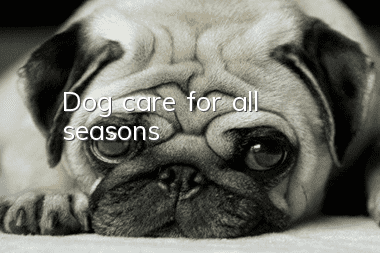Dog care for all seasons

1. Spring - is the season when dogs are in heat, mating, breeding and moulting. Pay attention to the management of dogs in heat, comb their coats, and prevent skin diseases. When a dog is in estrus, its physiological functions and behavior often undergo some special changes. Female dogs in estrus will wander around, so they must be well looked after and not allowed to go out to mate freely, especially for fine purebred dogs, to prevent breed degradation. Male dogs often fight for their mates and are easily injured. If any injuries are discovered, they must be treated promptly. --Spring is also the shedding season. The thick winter coat will fall off. If it is not combed in time and frequently, the unclean skin will cause itching. The dog will scratch and rub the body to eliminate the itching, which will easily break the skin and cause bacterial infection. Dirty coats are prone to matting, providing a favorable place for the reproduction of external parasites and fungi, causing skin diseases. Therefore, attention should be paid to combing and cleaning the coat in spring to prevent skin diseases. 2. Autumn - Autumn is the second breeding season of the year, and the dog's appetite and food intake increase, and summer hair begins to fall off, and autumn hair begins to grow. Many similarities. Food is plentiful in autumn, so the amount of food should be increased and the quality should be improved to make physical reserves for the winter. Pay attention to combing the coat to promote the growth of winter hair. In late autumn, the temperature difference between day and night is large, so the kennel should be well insulated at night to prevent colds. 3. Winter - the weather is cold, and the focus of management should be on preventing cold and heat preservation and preventing respiratory diseases. As the temperature drops, the body is attacked by cold air, or due to improper management, not paying attention to cold protection and heat preservation, being exposed to rain and wind after exercise, or the kennel is damp, etc., all can cause colds. In severe cases, respiratory diseases such as tracheitis and pneumonia can occur. Effective measures to prevent colds are to prevent colds and heat, thicken mattresses, and replace them in time to keep them dry and prevent wind. When the weather is warm, families should exercise outdoors to strengthen their physical fitness and improve disease resistance. Sunbathing on the sun can not only keep you warm, but the ultraviolet rays in the sun also have the effect of disinfection and sterilization, and can promote the absorption of calcium, which is beneficial to the growth and development of bones and prevents rickets in puppies. 4. Summer - the air is humid and the climate is hot. Pay attention to preventing heat stroke, moisture and food poisoning. Dogs in environments with high temperatures and high humidity are prone to heatstroke due to difficulty in dissipating body heat. For this reason, activities under the hot sun should be avoided, the kennel should be located in a cool place, and dogs should be given frequent cold water baths in hot weather. When you find that your dog has difficulty breathing, increased skin temperature, rapid heartbeat and other symptoms, you should quickly apply a cold wet towel to the head, move it to a cool and ventilated place, and ask a veterinarian for treatment immediately. To prevent moisture, bedding materials such as bedding and humiliation should be changed and dried frequently. After washing the kennel with water, the dog must be completely dried before entering the kennel. Dogs that are wet by rain should be wiped dry with a towel in time. --Summer dog feed is prone to spoilage, deterioration, and food poisoning. Therefore, the best food for dogs is fresh food that has been heated to prevent coldness. The amount should be appropriate and there should be no leftovers. We must resolutely throw away food that has gone bad, and we must not keep it for fear of waste. Because spoiled food may contain bacterial toxins, even high-temperature treatment cannot destroy them. If a dog eats food containing toxins, it can cause food poisoning.Drug poisoning will cause death if not treated in time. Therefore, if your dog is found to have vomiting, diarrhea, or general weakness soon after feeding, please consult a veterinarian immediately. --The temperature is high in summer, and loss of appetite is easy to occur. At this time, you should reduce meat consumption, increase fresh vegetables and broth, or appropriately change the type of feed and provide more water. In addition, you should always pay attention to cleaning your eyes and ears to prevent skin eczema.
Random articles
- If your dog snores while sleeping, it may be due to these diseases!
- If a dog suffers from these 8 diseases, the owner should isolate it, otherwise the owner and other dogs will suffer.
- How to repel mosquitoes for dogs in summer? Let dogs spend the summer safely!
- What's going on with the dog's eyes?
- Prevent your dog from getting lost: Help your dog wear an anti-lost dog tag and master these emergency methods
- What medicine should be used when a dog is bitten in a fight?
- How much does a poodle cost? How should I choose a Poodle?
- What should I do if my poodle has a cold and cough? What are the causes of VIP cough?
- How to care for a paralyzed dog
- Have you ever done five behaviors that make your dog sad?



